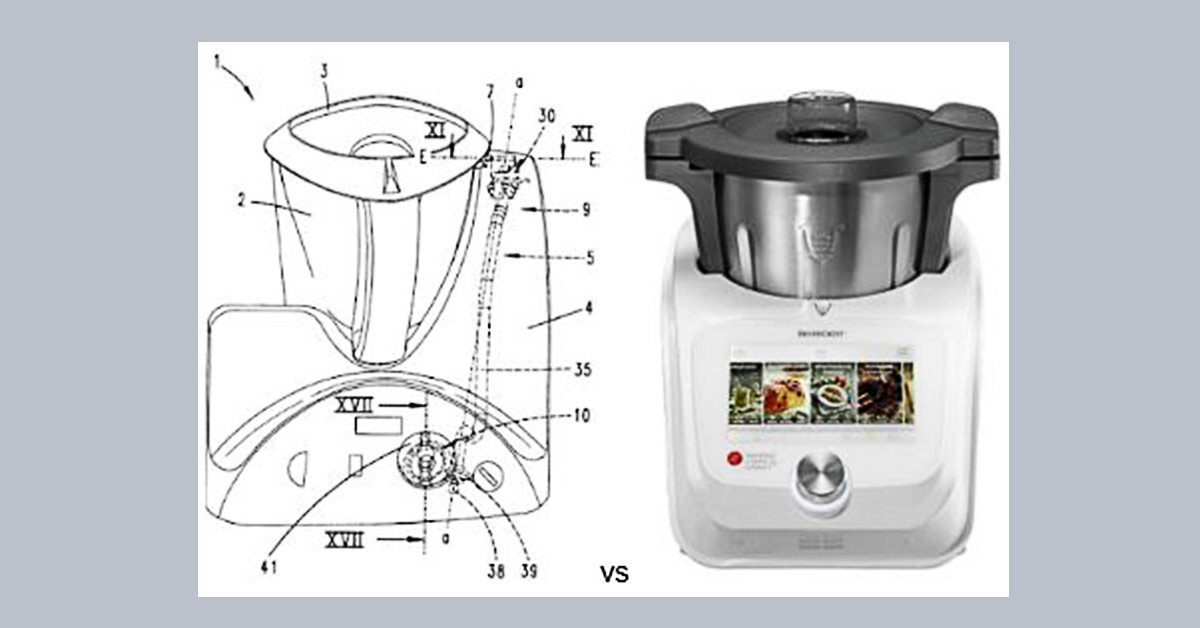
01 Apr “Thermomix” beats Lidl’s “Monsieur Cuisine Connect” in the battle of the kitchen robots
Kitchen robots allow us to cook healthier and faster. Their sales have soared in recent years, especially during the Covid-19 quarantine period. Is the market supply now down to one less? The robot “Monsieur Cuisine Connect”, one of the most popular and best-selling in Spain, is to be withdrawn from the market. We look at what the Court has said and how it affects consumers who have bought it.
On 19 January 2021, the Commercial Court No. 5 of Barcelona upheld the complaint of the German company Vorwerk & Co. Interholding GmbH, manufacturer of the kitchen machine “Thermomix”, declaring that supermarket chain Lidl Supermercados S.A. infringed, with its kitchen robot “Monsieur Cuisine Connect”, Vorwerk’s patent protecting the technology consisting of a “Food processor”.
What was the main issue? According to the Court, the essence of the invention claimed in Vorwerk’s patent is that food can be weighed regardless of whether the mixing vessel is secured or not or whether the lid is open or closed if the kitchen machine is plugged into the mains and switched on. This makes it possible to weigh something by placing it on the closed lid without having to open it, and also by placing it in the mixing vessel with the lid open. The robot “Monsieur Cuisine Connect” has this function.
The judgment confirms the validity of Vorwerk’s patent by declaring that its main claim does not include an extension or generalisation of subject matter due to a modification of the main claim with respect to the text of the original application (quite the opposite, in the Court’s opinion) and that it meets the patentability requirements of novelty and inventive step, contrary to what Lidl maintained in its counterclaim. The Court emphasises that “the technical solution was simple but not obvious, since, in view of the documents referred to, the problem of a kitchen machine that could weigh food in the container or mixing vessel irrespective of the state of the switch did not arise”.
Regarding the infringement, the dispute revolved around the interpretation of the feature that the mixing vessel and lid can be interlocked in such a way that no intervention inside the mixing vessel is possible when the machine is operating.
According to the judgment, the correct interpretation is that when the lid is interlocked by rotation around the vertical axis, this rotational position defines the operating position of the mixing vessel in such a way that no intervention inside the mixing vessel is possible during operation.
Thus, based on the evidence and videos provided by Vorwerk of the construction and operation of the robot “Monsieur Cuisine Connect”, the judgment concludes that it has all feature of the main (first) claim of Vorwerk’s patent, including the disputed feature, as interpreted by the Court. Consequently, and after rejecting Lidl’s additional non-infringement arguments that the safety system, the blade attachment, the whisk attachment and the filling hole in the lid would allow intervention inside the mixing vessel while it is in operation, the judge finds that Lidl infringes Vorwerk’s patent.
What are the consequences for Lidl? It must stop importing, storing, offering, and marketing the robot “Monsieur Cuisine Connect” and withdraw all its stock from the market (shops and stores). Besides, it must pay the costs of the lawsuit and damages to Vorwerk for the damages caused, the amount of which will be determined in the enforcement procedure once the judgment has become final.
Lidl may now appeal against the judgment; however, it must comply with the orders contained in the dictum. Otherwise, Vorwerk may request provisional enforcement.
The judgment is well reasoned and well drafted; it analyses in detail and gives a reasoned response to all the technical issues in dispute, relying at all times on the documentary and graphic evidence submitted and the opinions of the experts who have intervened. It seems that Lidl would have a difficult time on appeal.
And how does it affect consumers? If the judgement becomes final, it would be interesting to see how Lidl manages the legal guarantee and after-sales service of the machines already purchased by consumers. They do not have to return them because of the patent infringement (nobody is going to take the robots away from them, they can rest assured); they must continue enjoying the minimum legal guarantee of 2 years from the date of purchase (reinforced in the first 6 months), which includes free repair (which implies availability of spare parts), free replacement, price reduction and termination of the contract with the seller [Arts. 118 and 120 of the General Law for the Defence of Consumers and Users].
If the purchased product is faulty, consumers may choose between requesting its repair or its replacement, unless one of these two options is objectively impossible or disproportionate [Art. 119(1) of the Law mentioned above]. It is our understanding that, if the judgment becomes final, the replacement of kitchen robot of Lidl will be compromised and perhaps impossible, meaning that consumers might only be able to demand the repair in case of a faulty product. In any case, there may be conflicting opinions on that point.
We reported on the background to this case in our November 2020 Newsletter. You can read the relevant article HERE.
Written by Emil Edissonov



